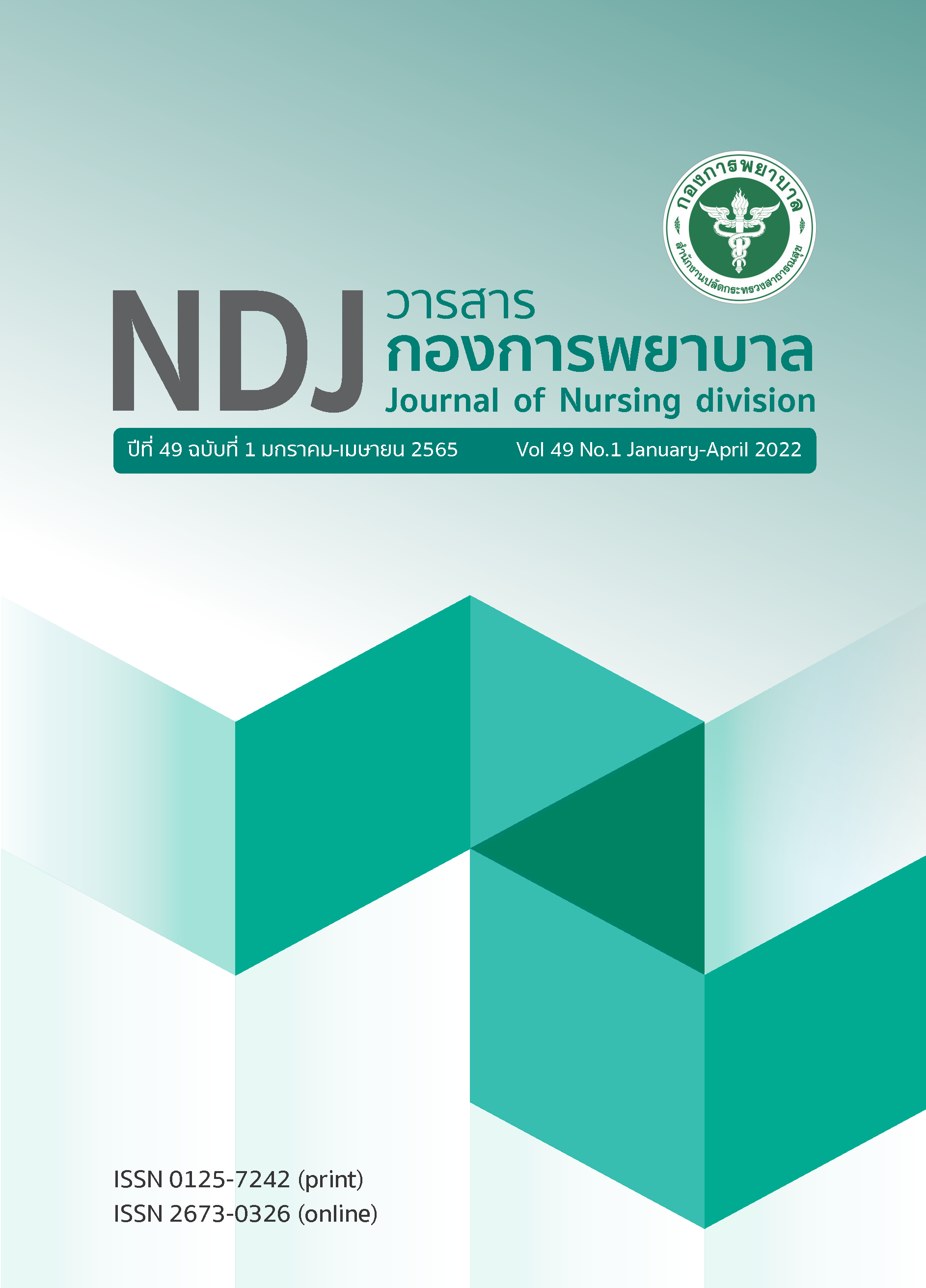การพัฒนารูปแบบการพยาบาลผู้ป่วยมะเร็งที่มีภาวะเม็ดเลือดขาวต่ำจากการได้รับยาเคมีบำบัด
Main Article Content
บทคัดย่อ
การวิจัยครั้งนี้เป็นการวิจัยและพัฒนา มีวัตถุประสงค์เพื่อพัฒนารูปแบบการพยาบาลผู้ป่วยมะเร็งที่มีภาวะเม็ดเลือดขาวต่ำจากการได้รับยาเคมีบำบัด และศึกษาผลของการใช้รูปแบบการพยาบาล กลุ่มตัวอย่าง คือ ผู้ป่วยมะเร็งเต้านมที่รับการรักษาด้วยยาเคมีบำบัด ดำเนินการ 4 ระยะ ดังนี้ (1) วิเคราะห์สภาพปัญหาและสถานการณ์ (2) พัฒนารูปแบบการพยาบาล (3) นำรูปแบบไปใช้ และ (4) ประเมินผลลัพธ์ทางการพยาบาลจากการใช้รูปแบบ วิเคราะห์ข้อมูลด้วย ความถี่ ร้อยละ ค่าเฉลี่ย ส่วนเบี่ยงเบนมาตรฐาน และสถิติ Paired t-test
ผลการวิจัย พบว่า หลังได้รับการพัฒนา พยาบาลวิชาชีพมีค่าเฉลี่ยคะแนนความรู้สูงกว่าก่อนการพัฒนาอย่างมีนัยสำคัญทางสถิติที่ระดับ .05 และค่าเฉลี่ยคะแนนความรู้ในการปฏิบัติตัวของผู้ป่วยหลังการใช้รูปแบบสูงกว่าก่อนใช้อย่างมีนัยสำคัญทางสถิติที่ระดับ .05 คะแนนความพึงพอใจของผู้ป่วยต่อการใช้รูปแบบในภาพรวมอยู่ในระดับมาก (Mean 4.47, SD .50) คะแนนความคิดเห็นของพยาบาลต่อความเป็นไปได้ในการนำรูปแบบไปใช้อยู่ในระดับมาก (Mean 4.35, SD .58) การเปรียบเทียบผลลัพธ์ทางคลินิก พบว่า ผู้ป่วยกลุ่มที่ไม่ได้ใช้รูปแบบการพยาบาล มีอัตราการเกิดภาวะไข้ร่วมกับเม็ดเลือดขาวต่ำ อัตราการเกิดภาวะติดเชื้อในกระแสเลือด และอัตราการเลื่อนนัดสูงกว่าผู้ป่วยที่กลุ่มที่ใช้รูปแบบการพยาบาล
Article Details

อนุญาตภายใต้เงื่อนไข Creative Commons Attribution-NonCommercial-NoDerivatives 4.0 International License.
เอกสารอ้างอิง
Thaksin Jansing. The Colony-Stimulating Factors and Febrile Neutropenia. Thai Pharmaceutical and Health Science Journal. 2019;14(3):136-45. Thai.
Moore DC. Drug-Induced Neutropenia: A Focus on Rituximab-Induced Late-Onset Neutropenia. P & T: A peer-reviewed journal for formulary management. 2016;41(12):765–68.
Common Terminology Criteria for Adverse Events (CTCAE) Version 5.0, 2017. [Internet]. 2021 Aug 1 [cited Aug 4] . Available from:https://ctep.cancer.gov/protocoldevelopment/electronic _applications/docs/ctcae_v5_quick_reference_5x7.pdf
Warnock C. Neutropenic sepsis: prevention, identification and treatment. Nursing standard, Royal College of Nursing, Great Britain. 2016: 30(35), 51–60.
Wang XJ, Wong CM, Chan A. Psychometric properties of the functional assessment of cancer therapy-neutropenia in Asian cancer patients with chemotherapy-induced neutropenia. J Pain Symptom Management. 2016;52(3):428-36.
Oakley C, Hill A, Chowdhury, S. Benefits of a network approach to managing neutropenic sepsis. Cancer Nursing Practice. 2010;9(5):17-21.
Titler MG, Kleber C, Steelman VJ, Rakel BA, Budreau G, Everett LQ, et al. The IOWA model of evidence based practice to promote quality care. Crit Care Nurs Clin North Am. 2001;13:497-509.
Apichaya Luepuech, Kwanjit Danwilai. Incidence and risk factors of neutropenia in breast cancer patients receiving intravenous chemotherapy at King Chulalongkorn Memorial Hospital. Thai Journal of Pharmacy Practice. 2017;9(1):180-91. Thai.
Klastersky J, de Naurois J, Rolston K, et al. Management of febrile neutropaenia: ESMO Clinical Practice Guidelines. Ann Oncol. 2016;27(suppl 5):111-18.
Ba Y, Shi Y, Jiang W, et al. Current management of chemotherapy-induced neutropenia in adults: Key points and new challenges: Committee of Neoplastic Supportive-Care (CONS), China Anti-Cancer Association Committee of Clinical Chemotherapy, China Anti-Cancer Association. Cancer Biol Med. 2020;17(4):896-909.
Klastersky J, Paesmans M, Rubenstein EB, et al. The Multinational association for supportive care in cancer risk index: A multinational scoring system for identifying low-risk febrile neutropenic cancer patients. J Clin Oncol. 2000;18(16):3038-51.
Pichitra Lekdamrongkul. Risk Assessment and Management of febrile neutropenia in cancer patients receiving chemotherapy: Role of nurse. Thai Journal of Nursing Council. 2015;30(1): 5-15. Thai.
Titaporn Worapanwisit, Chompoo Paritsiraprapa, Witchaya Rotchanarak. Prevention of febrile neutropenia in acute leukemia patients: Role of nurse. Journal of The Royal Thai Army Nurses. 2020;21(3):11-9. Thai.
Mak WC, Yin Ching SS. Effect of an education program on knowledge, self-care behavior and hand washing competence on prevention of febrile neutropenia among breast cancer patients receiving Doxorubicin and Cyclophosphamide in Chemotherapy Day Centre. Asia Pac J Oncol Nurs. 2015;2(4):276-88.


